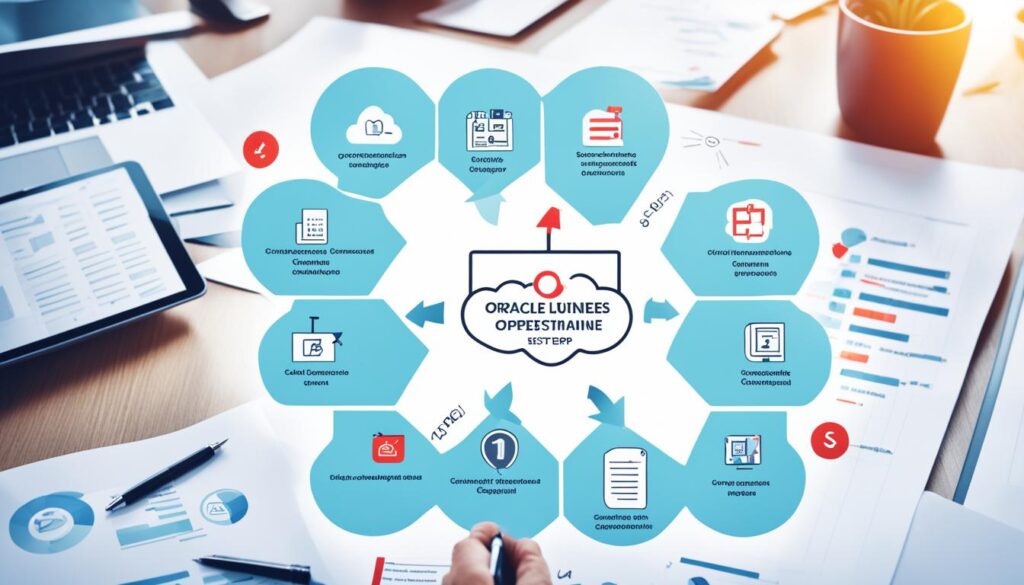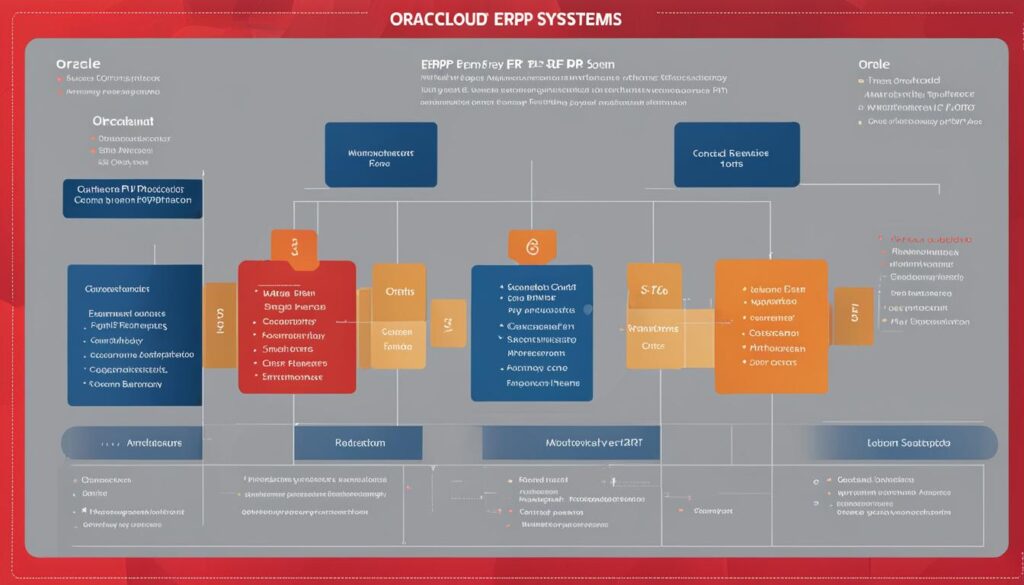Are you tired of juggling multiple software applications to manage your business operations? Seeking a streamlined solution that provides real-time insights and automation? Look no further than Oracle ERP Cloud.
Oracle ERP Cloud is a comprehensive, cloud-based Enterprise Resource Planning (ERP) suite designed to streamline organizational business processes. It offers integrated applications for managing functions like finance, procurement, project management, and risk management. With real-time analytics, advanced security, and scalability, Oracle ERP Cloud facilitates efficient, data-driven decision-making and process automation for businesses of all sizes.
Key Takeaways:
- Oracle ERP Cloud offers a comprehensive suite of applications for managing business processes.
- Real-time analytics and advanced security enhance operational efficiency.
- Scalability and flexibility allow businesses to adapt to changing needs.
- Streamlined processes and automation lead to improved productivity.
- Data-driven decision-making is enabled by Oracle ERP Cloud’s comprehensive suite of applications.
What is Oracle ERP Cloud?
Oracle ERP Cloud is an enterprise resource planning suite delivered via a software-as-a-service (SaaS) model. It automates and manages day-to-day business activities such as accounting, procurement, project management, risk management, and supply chain transactions. Oracle ERP Cloud provides a suite of products tailored to various business needs, covering financial transactions and processes, accounting needs, procurement processes, project management, administration and collaboration, and risk management. It also integrates with enterprise performance management systems for financial consolidation, planning, and budgeting. By transitioning to a SaaS model, companies eliminate the burden of maintaining on-premise software and receive regular software updates.
Transforming Business Operations with Oracle ERP Cloud
Oracle ERP Cloud offers businesses a comprehensive and modern solution for streamlining their operations. By leveraging the power of cloud technology and the convenience of the SaaS model, organizations can effectively automate and manage critical business processes, enabling them to operate more efficiently.
Key Features of Oracle ERP Cloud
“Oracle ERP Cloud provides a suite of products tailored to various business needs, covering financial transactions and processes, accounting needs, procurement processes, project management, administration and collaboration, and risk management.”
Oracle ERP Cloud offers a wide range of features that cater to different aspects of business operations. These features include:
- Financial Management: Comprehensive tools for accounting, financial reporting, and automation of financial processes.
- Procurement: Streamlined sourcing and supplier management processes.
- Project Management: Support for project planning, execution, and collaboration.
- Risk Management: AI-powered automated monitoring and risk identification.
- Enterprise Performance Management: Enables budgeting, forecasting, and performance reporting.
By incorporating these features, Oracle ERP Cloud empowers businesses to achieve operational efficiency, gain real-time insights, and simplify compliance management.
Migrating to Oracle ERP Cloud
Moving to Oracle ERP Cloud offers significant advantages for organizations. By transitioning to a cloud-based solution, businesses eliminate the need for expensive hardware infrastructure and reduce the costs associated with maintaining and updating on-premise software. Additionally, Oracle ERP Cloud provides regular software updates, ensuring that businesses have access to the latest features and advancements without any additional effort on their part.
Furthermore, the scalability and flexibility of Oracle ERP Cloud make it ideal for businesses of all sizes. Whether an organization is experiencing growth or downsizing, the cloud-based solution seamlessly adjusts to accommodate changing needs.
Overall, Oracle ERP Cloud empowers businesses to transform their operations, enhance decision-making, and achieve greater efficiency through a comprehensive suite of features delivered via a convenient SaaS model.
Key Features of Oracle ERP Cloud
Oracle ERP Cloud offers a range of key features that enhance business operations. These features provide businesses with powerful tools to streamline processes, improve efficiency, and drive growth. Let’s explore some of the key features:
1. Financial Management
The financial management module in Oracle ERP Cloud provides comprehensive tools for accounting, financial reporting, and automation of financial processes. It enables businesses to efficiently manage their finances, track expenses, and generate accurate financial statements.
2. Procurement
The procurement module streamlines sourcing and supplier management, making it easier for businesses to find the right suppliers, negotiate contracts, and manage the procurement process. It helps businesses optimize their supply chain, reduce costs, and ensure timely delivery of goods and services.
3. Project Management
The project management module supports project planning, execution, and collaboration. It allows businesses to effectively manage their projects, allocate resources, track progress, and ensure timely completion. Collaboration tools enable effective communication and coordination among team members, driving project success.
4. Risk Management
The risk management module in Oracle ERP Cloud leverages AI technology to automate monitoring and risk identification. It helps businesses identify and mitigate potential risks, ensuring compliance with regulations and safeguarding against financial loss.
5. Enterprise Performance Management
Enterprise performance management enables businesses to streamline budgeting, forecasting, and performance reporting. It provides real-time insights into financial and operational performance, helping businesses make data-driven decisions and achieve business objectives.
These key features of Oracle ERP Cloud offer numerous benefits to businesses, ranging from improved operational efficiency to simplified compliance management. Let’s take a closer look at some of the benefits:
- Enhanced operational efficiency through streamlined processes and automation.
- Real-time insights into financial and operational performance, enabling data-driven decision-making.
- Improved collaboration and coordination among project teams.
- Effective risk management and compliance with regulations.
- Accurate financial reporting and compliance with accounting standards.
Oracle ERP Cloud empowers businesses to optimize their operations, drive growth, and gain a competitive edge in the market.
| Key Features | Benefits |
|---|---|
| Financial Management | Accurate financial reporting and streamlined financial processes |
| Procurement | Optimized supply chain, reduced costs, and improved supplier management |
| Project Management | Effective project planning, execution, and collaboration |
| Risk Management | Automated risk identification and compliance management |
| Enterprise Performance Management | Real-time insights and data-driven decision-making |
Implementing Oracle ERP Cloud can significantly transform business operations, driving efficiency, improving decision-making, and ensuring compliance.

Benefits of Using Oracle ERP Cloud
Implementing Oracle ERP Cloud offers numerous benefits for businesses. The scalability and flexibility of the cloud-based solution allow organizations to adapt to changing business needs and support growth. The system offers enhanced data security and compliance, with robust security measures and regular updates to meet regulatory standards. Real-time analytics and reporting provide businesses with instant access to data and empower data-driven decision-making. Additionally, Oracle ERP Cloud eliminates the need for on-premise software maintenance and provides regular software updates from Oracle. This ensures businesses have access to the latest technologies and advancements without the burden of managing their own system.
Let’s take a closer look at the key benefits:
- Scalability and Flexibility: Oracle ERP Cloud offers a scalable and flexible solution that can grow with your business. As your business needs evolve, the cloud-based platform allows you to easily add or remove users, modules, and functionalities as required. This enables organizations to scale their operations without the need for significant infrastructure investments or disruptions.
- Data Security and Compliance: With Oracle ERP Cloud, data security is a top priority. The system employs robust security measures to protect sensitive data, including encryption, access controls, and regular security updates. Furthermore, Oracle ensures compliance with industry and regulatory standards, helping businesses meet their compliance obligations and maintain data integrity.
- Real-time Analytics and Reporting: Oracle ERP Cloud provides businesses with real-time insights into their operations. Through advanced analytics and reporting capabilities, organizations can monitor key performance indicators (KPIs), track financial performance, and gain valuable insights to drive informed decision-making. With instantaneous access to accurate and up-to-date data, businesses can identify trends, spot opportunities, and address challenges promptly.
- Elimination of On-premise Maintenance: By implementing Oracle ERP Cloud, businesses can eliminate the need for on-premise software maintenance. Oracle takes care of system updates, bug fixes, and performance enhancements, ensuring that businesses always have access to the latest features and technologies. This frees up IT resources and allows organizations to focus on core business activities.
Implementing Oracle ERP Cloud brings significant advantages to businesses, enabling them to streamline operations, enhance security, and leverage real-time insights for informed decision-making. By harnessing the power of the cloud, organizations can optimize their business processes, increase efficiency, and drive growth.
Oracle ERP Cloud Pricing
When it comes to pricing, Oracle offers flexible options for ERP Cloud based on the specific needs of each organization. The pricing models typically include subscription-based plans, which can be tailored to suit the size and requirements of businesses. The cost of Oracle ERP Cloud can vary depending on factors such as the number of users, modules utilized, and any additional customizations or integrations required. It is recommended to consult with a representative from Oracle to determine the most suitable pricing package for your organization.

| Benefits | Description |
|---|---|
| Scalability and Flexibility | The cloud-based solution allows businesses to easily scale their operations and adapt to changing needs without the need for extensive infrastructure investments. |
| Data Security and Compliance | Oracle ERP Cloud employs robust security measures to protect sensitive data and ensures compliance with industry and regulatory standards. |
| Real-time Analytics and Reporting | Organizations can access real-time insights and make data-driven decisions by leveraging advanced analytics and reporting capabilities. |
| Elimination of On-premise Maintenance | Oracle takes care of system updates and maintenance, eliminating the need for businesses to manage on-premise software. |
Top 5 Best Practices for Implementing Oracle ERP Cloud
Implementing Oracle ERP Cloud successfully requires following a set of best practices that ensure a smooth transition and maximize the benefits of the system. By adhering to these practices, businesses can effectively align their objectives, prepare their organization, provide ongoing support, execute accurate data migration, and continuously evaluate and improve their implementation.
- Clearly Define Business Objectives: It is crucial to clearly define and align your business objectives with the overall business strategy before implementing Oracle ERP Cloud. This helps in setting specific goals and expectations, ensuring that the system is implemented in a way that supports your organization’s long-term vision.
- Effective Change Management: Prepare your organization for the implementation of Oracle ERP Cloud by implementing effective change management strategies. Communicate the reasons behind the implementation, provide training to employees, and address any concerns or resistance to change. This ensures a smooth transition and successful adoption of the new system.
- Comprehensive Training Programs and Ongoing Support: To ensure user adoption and success, provide comprehensive training programs to employees who will be using the Oracle ERP Cloud system. This equips them with the necessary skills and knowledge to effectively use the system. Additionally, offer ongoing support and resources to address any questions or issues that may arise.
- Careful Planning and Execution of Data Migration: Plan and execute data migration strategies carefully to ensure an accurate transfer of data from the old system to Oracle ERP Cloud. This involves mapping data fields, cleansing data, and testing the migration process to maintain data integrity and minimize disruptions during the transition.
- Continuous Evaluation and Feedback: Continuously evaluate the performance of the Oracle ERP Cloud system and seek feedback from users. This allows you to identify any challenges or areas for improvement and take proactive measures to address them. Regularly update and optimize your implementation to ensure optimal system performance and user satisfaction.

By following these best practices, businesses can optimize their Oracle ERP Cloud implementation, ensuring a successful transition and maximizing the benefits of the system. Clear objectives, effective change management, comprehensive training, careful data migration, and continuous evaluation contribute to a seamless and efficient adoption of Oracle ERP Cloud.
Case Studies and Success Stories
Oracle ERP Cloud has proven to be a game-changer for numerous organizations, revolutionizing their business operations and driving significant improvements. Let’s explore some compelling case studies and success stories that highlight the transformative power of Oracle ERP Cloud.
Global Retail Company
“Implementing Oracle ERP Cloud allowed our global retail company to streamline financial processes and achieve unprecedented operational efficiency and cost savings. The integrated suite provided us with real-time insights and analytics, enabling data-driven decision-making and optimizing our financial management.”
Healthcare Provider
“Oracle ERP Cloud became the backbone of our healthcare operations, seamlessly integrating patient care and administrative processes. The result? Improved patient care, enhanced data management, and streamlined workflows that have revolutionized the way we deliver quality healthcare services.”
Manufacturing Enterprise
“By automating our supply chain and production planning processes with Oracle ERP Cloud, we experienced remarkable improvements in our production cycles and significant reductions in operational costs. The seamless integration and advanced analytics capabilities provided us with valuable insights and empowered us to make data-driven decisions.”
Educational Institution
“Oracle ERP Cloud played a pivotal role in our educational institution by unifying various administrative departments onto a single platform. This integration improved data sharing, enhanced resource management, and streamlined our operations, ultimately elevating our institution’s overall performance.”
Financial Services Firm
“Our financial services firm greatly benefited from the implementation of Oracle ERP Cloud, which enhanced our risk management and financial reporting capabilities. With real-time data and advanced analytics at our fingertips, we could make informed decisions, ensure compliance, and drive the success of our organization.”
These case studies demonstrate how Oracle ERP Cloud has successfully transformed diverse industries, addressing business challenges and fueling growth and success. Whether it’s optimizing financial processes, improving healthcare delivery, enhancing manufacturing efficiency, elevating educational standards, or empowering risk management, Oracle ERP Cloud has consistently delivered unparalleled results.
| Organization | Benefits |
|---|---|
| Global Retail Company | Streamlined financial processes, increased operational efficiency, and cost savings |
| Healthcare Provider | Integrated patient care and administrative processes, improved patient care, and better data management |
| Manufacturing Enterprise | Automated supply chain and production planning processes, more efficient production cycles, and reduced operational costs |
| Educational Institution | Unified various administrative departments onto a single platform, improved data sharing, and resource management |
| Financial Services Firm | Enhanced risk management and financial reporting capabilities, improved compliance, and decision-making |

Oracle ERP Cloud Integration with Other Systems
Oracle ERP Cloud offers seamless integration with other systems through the use of APIs and middleware. This integration capability allows for smooth connectivity with third-party applications and legacy systems, enabling data synchronization and consistent data flow between different platforms.
Integrating Oracle ERP Cloud with other business applications and services is essential for businesses looking to maximize the benefits of the ERP system and ensure smooth operations. By integrating with other systems, organizations can centralize their data, streamline processes, and eliminate the need for manual data entry and reconciliation between different platforms.
Whether it’s connecting with CRM systems, e-commerce platforms, or other enterprise applications, Oracle ERP Cloud API provides the necessary tools and protocols to establish secure and reliable communication between systems. This enables the seamless exchange of data, such as customer information, sales orders, inventory levels, and financial transactions, ensuring real-time visibility and accurate reporting across the organization.
Benefits of Oracle ERP Cloud Integration
1. Improved Data Accuracy and Efficiency: Integration eliminates the need for manual data entry and reduces the risk of errors and inconsistencies. This leads to improved data accuracy and efficiency in business processes.
2. Streamlined Workflows: Integration enables data to flow seamlessly between systems, automating tasks and workflows. This streamlines processes and reduces the time and effort required for data synchronization and reconciliation.
3. Enhanced Reporting and Analytics: By integrating Oracle ERP Cloud with other systems, businesses can leverage the combined data to gain valuable insights and make data-driven decisions. This enhances reporting and analytics capabilities, empowering organizations to identify trends, optimize operations, and drive business growth.
4. Scalability and Adaptability: Integration allows businesses to scale their operations and adapt to changing business needs. With seamless connectivity between systems, organizations can easily add new applications and functionalities as their requirements evolve.
To illustrate the benefits of Oracle ERP Cloud integration, let’s take a look at a case study:
XYZ Corporation, a global manufacturing company, successfully integrated Oracle ERP Cloud with their CRM system. This integration enabled them to streamline their sales and order management processes, ensuring accurate and real-time availability of inventory and order status. As a result, XYZ Corporation saw a significant improvement in their order fulfillment cycle time and customer satisfaction.
Overall, Oracle ERP Cloud integration empowers businesses to create a unified and connected ecosystem of applications, enabling seamless data flow and efficient business processes.
Comparative Analysis: Oracle ERP Cloud vs. Other ERP Systems
When comparing Oracle ERP Cloud to other ERP systems, several factors come into play. Oracle ERP Cloud offers the scalability and flexibility of a cloud-based solution, allowing businesses to adapt to changing needs and support growth. It provides advanced security measures and compliance assurance, with regular updates to meet regulatory standards. Real-time analytics and reporting capabilities provide businesses with instant access to data and insights. Additionally, Oracle ERP Cloud’s integration capabilities and comprehensive suite of features set it apart from other ERP systems.
One of the key advantages of Oracle ERP Cloud is its scalability. With the cloud-based architecture, businesses can easily scale their operations up or down based on their needs. Whether it’s expanding into new markets or responding to changing industry trends, Oracle ERP Cloud provides the flexibility to accommodate growth and adapt to evolving business requirements.
Another critical aspect is security and compliance. Oracle ERP Cloud incorporates advanced security measures to protect sensitive data and ensure regulatory compliance. With regular updates and patches, the system remains up-to-date with the latest security protocols, safeguarding against potential threats. This ensures peace of mind for businesses, knowing that their data is secure and protected.
Real-time analytics and reporting capabilities are essential for businesses looking to make data-driven decisions. Oracle ERP Cloud provides a comprehensive suite of analytical tools that enable businesses to access real-time data and gain valuable insights. With customizable dashboards, trend analysis, and forecasting capabilities, businesses can identify patterns, monitor performance, and make informed decisions based on actionable data.
Moreover, Oracle ERP Cloud stands out from other ERP systems through its integration capabilities. It seamlessly integrates with other business applications, allowing for smooth data flow and eliminating the need for manual data entry and reconciliation. By integrating various systems and streamlining processes, businesses can improve efficiency and reduce errors.
In conclusion, Oracle ERP Cloud offers a robust and comprehensive solution for businesses seeking an ERP system. Its scalability, advanced security measures, real-time analytics, and integration capabilities make it a standout choice among other ERP systems. Whether it’s adapting to changing business needs, ensuring data security and compliance, accessing real-time insights, or streamlining processes through integration, Oracle ERP Cloud provides the features and benefits needed to drive business success.

Conclusion
In conclusion, Oracle ERP Cloud stands out as a comprehensive and advanced cloud-based ERP solution that empowers businesses to streamline operations and drive data-driven decision-making. With its scalability, flexibility, and integration capabilities, Oracle ERP Cloud provides modern businesses with the tools they need to optimize their processes and achieve significant improvements in efficiency and productivity.
Successful implementation of Oracle ERP Cloud, accompanied by adherence to best practices, is key to unlocking the full potential of this powerful ERP solution. By clearly defining business objectives, effectively managing change, providing comprehensive training, and meticulous planning for data migration, businesses can ensure a seamless transition and maximize the benefits of Oracle ERP Cloud.
Organizations that deploy Oracle ERP Cloud can take advantage of real-time analytics, enhanced security, and regular software updates, all while eliminating the burden of on-premise software maintenance. With the ability to integrate with other business applications and services, Oracle ERP Cloud empowers businesses to achieve seamless connectivity and optimize their operations across the board.
In conclusion, Oracle ERP Cloud offers a compelling solution for businesses seeking to streamline their operations, drive efficiency, and harness the power of data-driven decision-making. With its robust features, scalability, and flexibility, Oracle ERP Cloud is a leading choice in the ever-evolving landscape of cloud-based ERP solutions.
